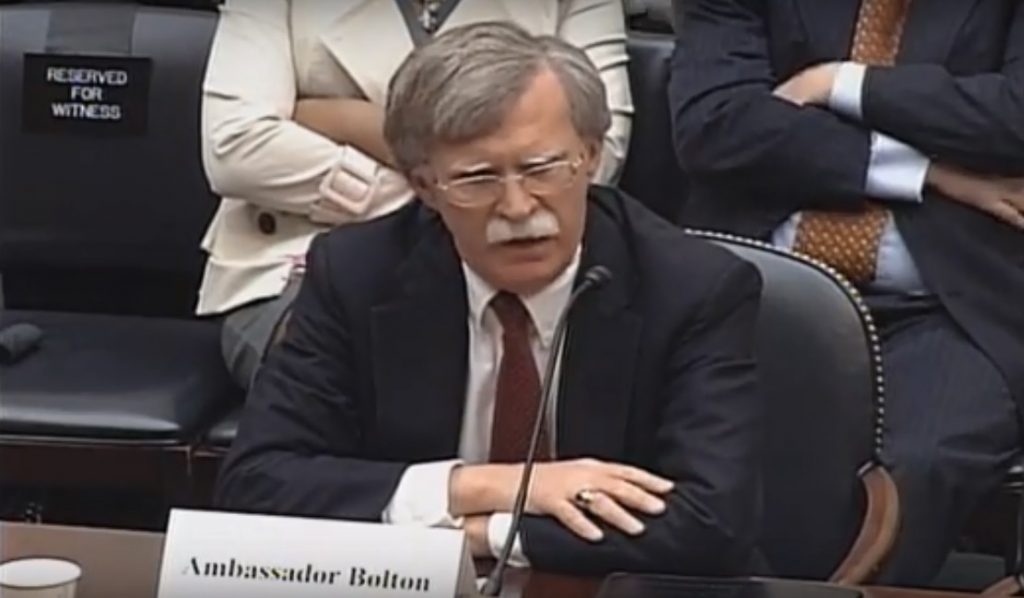
About a year into his presidency, President Trump has replaced key members of his foreign policy team. Former ExxonMobil CEO Rex Tillerson is expected to be replaced as secretary of state by former congressman Mike Pompeo, who for the past year has been the director of the Central Intelligence Agency. John Bolton is expected to replace Gen. H.R. McMaster as the national security adviser. Both Pompeo and Bolton are best known as hardliners when it comes to U.S. policy on Iran, and in the latter’s case also on Russia.
As congressman from 2011 to 2017, Pompeo saw his ANCA rating improve from C- to C+, after he co-sponsored legislation “Condemning the Genocide Against Christians and Other Minorities in the Middle East,” aimed against Islamic State in Iraq and Syria. Although Pompeo represented Kansas, a state that has a security partnership program with Armenia, he is not known to have been involved in it in any way. In mid-2016, Pompeo called both Iranian and Turkish governments “totalitarian Islamist dictatorships” on his twitter. He subsequently deleted the account and after his appointment to CIA made his first visit to Turkey.
The outgoing secretary Tillerson, for his part, sought to brush aside widespread criticism of Turkey’s military intervention in Syria and push for greater U.S.-Turkish cooperation on the ground. Ahead of Tillerson’s visit to Ankara in February, the U.S. dropped charges against most of Erdogan bodyguards accused of attacking peaceful protesters in Washington last year.
The new national security adviser Bolton is known as a backer of muscular American foreign policy and a critic of the international system, particularly the United Nations where he served as U.S. ambassador from 2005-6. Since then Bolton has been frequently cited as a commentator on international affairs.
Discussing then-vice president Dick Cheney’s visit to Tbilisi and Baku in September 2008, Bolton suggested that “the security of Georgia and Azerbaijan are of vital American interest for a variety of reasons, including the critical corridor they provide to get oil and natural gas out of the Caspian Basin region without transiting Russia or Iran. Europe should also understand this key point.”
In his June 2011 congressional testimony on Iran, when asked about the fact that the Obama Administration refused to sell weapons to Azerbaijan, in spite of its cooperation with Israel, Bolton responded with: “Our policy with regard to Azerbaijan does need to be modified. Obviously this is complicated by the conflict with Armenia and the range of disagreements with [Azerbaijan’s] internal policy. But given the importance of the Baku-Tbilisi-Ceyhan oil pipeline and the geographical location, I think this is a place, where this frozen conflict between Azerbaijan and Armenia needs more U.S. attention,” particularly in light of Russia’s efforts to restore its hegemony in the former Soviet space.
In March 2012 he accused the Obama administration of leaking plans for Israel-Azerbaijan military cooperation to undermine Israel’s war-planning against Iran.
Bolton has also been a critic of the Turkish government. “I have no charity in my heart for Erdogan, if he goes down I’m not shedding any tears,” he told Fox News as the coup attempt against Erdogan unfolded in July 2016. “I do not believe he is a friend to the United States.” (Trump’s first pick as national security adviser Michael Flynn made similar remarks before being hired as a lobbyist by Erdogan’s associates.)
Over the past several years, there has been a decline in U.S. attention to the Caucasus, which continued under the current administration. Although Trump had joint business projects with two prominent Azerbaijani entrepreneurs and received an early call with congratulations from Aliyev, he has yet to meet with the Azerbaijani president. (Aliyev did meet Tillerson during an energy summit in Turkey last July.) Armenia’s president is not known to have had any direct communications with senior administration officials since a call with then vice-president-elect Pence.
The Trump administration did appoint Andrew Schofer as a new envoy for Karabakh talks, not a simple matter of bureaucratic rotation considering that many positions in the State Department remain unfilled.
Georgia also got some attention: Trump hosted prime minister Giorgi Kvirikashvili at the White House in May 2017 and in November, U.S. approved the long-requested sale of Javelin anti-tank missiles to Georgia.









